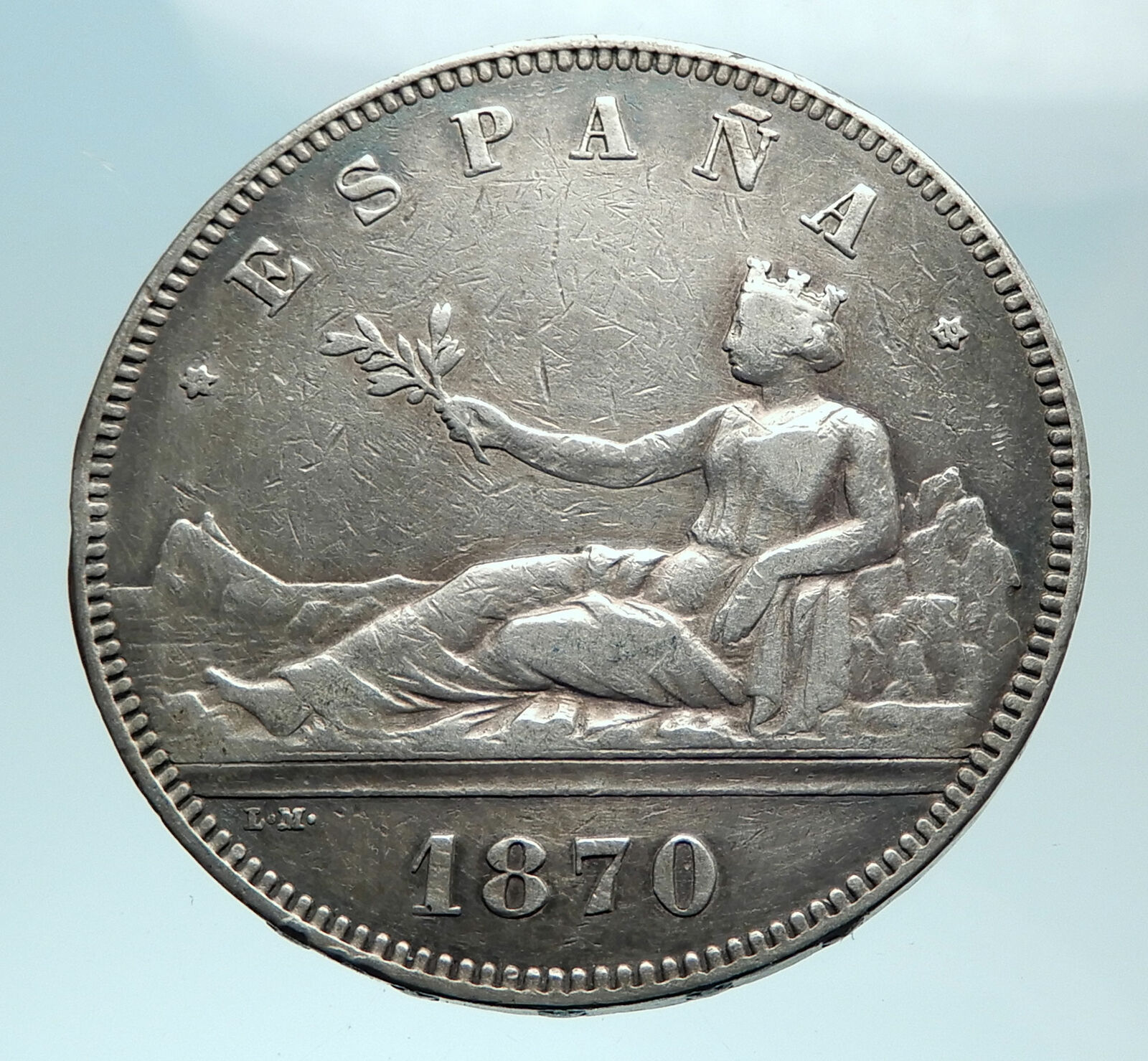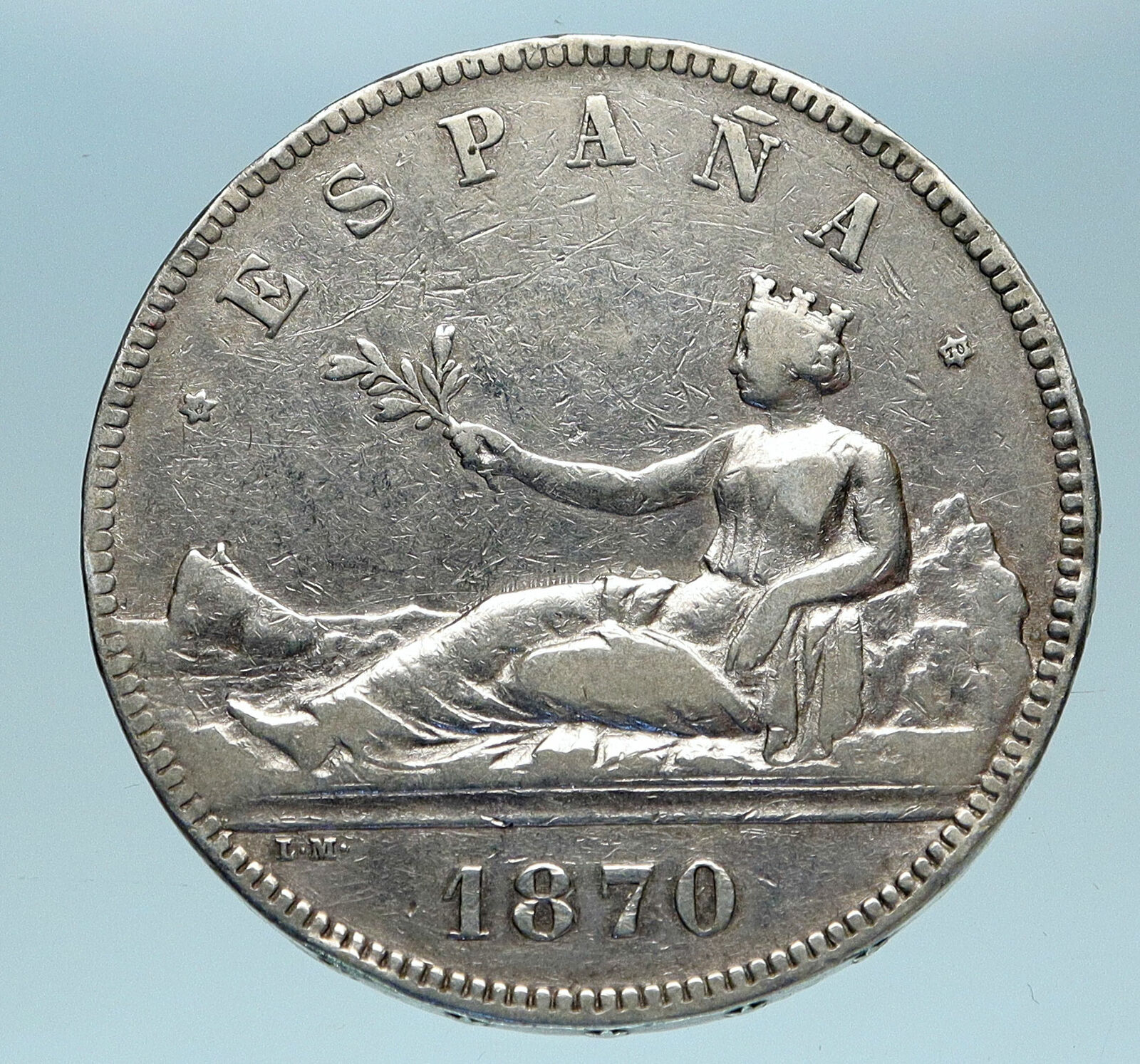|
Spain under Philip IV – King: 1621-1665
1621-26 Copper 8 Maravedis
24mm (5.20 grams)
Reference: Cal# 1523 (1621-26)
PHILIPPVS IIII D G, Castle in crowned shield. Mintmark at left.
HISPANIARVM REX 162, Lion in crowned shield.
You are bidding on the exact item pictured, provided with a Certificate of Authenticity and Lifetime Guarantee of Authenticity.
 Philip IV (April-June 1268 – 29 November 1314), called Philip the Fair (French: Philippe le Bel), was King of France from 1285 until his death (the eleventh from the House of Capet). By virtue of his marriage with Joan I of Navarre, he was also King of Navarre as Philip I from 1284 to 1305, as well as Count of Champagne. Although Philip was known as handsome, hence the epithet le Bel, his rigid and inflexible personality gained him (from friend and foe alike) other nicknames, such as the Iron King (French: le Roi de fer). His fierce opponent Bernard Saisset, bishop of Pamiers, said of him: “he is neither man nor beast. He is a statue.” Philip IV (April-June 1268 – 29 November 1314), called Philip the Fair (French: Philippe le Bel), was King of France from 1285 until his death (the eleventh from the House of Capet). By virtue of his marriage with Joan I of Navarre, he was also King of Navarre as Philip I from 1284 to 1305, as well as Count of Champagne. Although Philip was known as handsome, hence the epithet le Bel, his rigid and inflexible personality gained him (from friend and foe alike) other nicknames, such as the Iron King (French: le Roi de fer). His fierce opponent Bernard Saisset, bishop of Pamiers, said of him: “he is neither man nor beast. He is a statue.”
Philip relied on skillful civil servants, such as Guillaume de Nogaret and Enguerrand de Marigny, to govern the kingdom rather than on his nobles. Philip and his advisors were instrumental in the transformation of France from a feudal country to a centralized state. Philip, who sought an uncontested monarchy, compelled his vassals by wars and restricted feudal usages. His ambitions made him highly influential in European affairs. His goal was to place his relatives on foreign thrones. Princes from his house ruled in Naples and Hungary. He tried and failed to make another relative the Holy Roman Emperor. He began the long advance of France eastward by taking control of scattered fiefs.
The most notable conflicts of Philip’s reign include a dispute with the English over King Edward I’s fiefs in southwestern France, and a war with the Flemish, who had rebelled against French royal authority and humiliated Philip at the Battle of the Golden Spurs in 1302. In 1306, Philip expelled the Jews from France, and in 1307 he annihilated the order of the Knights Templar. He was in debt to both groups and saw them as a “state within the state”. To further strengthen the monarchy, Philip tried to take control of the French clergy, leading to a violent conflict with Pope Boniface VIII. This conflict resulted in the transfer of the papal court to the enclave of Avignon in 1309.
His final year saw a scandal amongst the royal family, known as the Tour de Nesle affair, in which Philip’s three daughters-in-law were accused of adultery. His three sons were successively kings of France, Louis X, Philip V, and Charles IV. Their deaths without surviving sons of their own would compromise the future of the French royal house, which until then seemed secure, precipitating a succession crisis that would eventually lead to the Hundred Years’ War (1337-1453).
 Spain, officially the Kingdom of Spain (Spanish: Reino de España), is a country mostly located on the Iberian Peninsula in Europe, with there also being two large archipelagoes, the Balearic Islands in the Mediterranean Sea and the Canary Islands off the African Atlantic coast, two cities, Ceuta and Melilla, on the African mainland and several small islands in the Alboran Sea near the African coast. The country’s mainland is bordered to the south and east by the Mediterranean Sea except for a small land boundary with Gibraltar; to the north and northeast by France, Andorra, and the Bay of Biscay; and to the west and northwest by Portugal and the Atlantic Ocean. It is the only European country to have a border with an African country (Morocco) and its African territory accounts for nearly 5% of its population, mostly in the Canary Islands but also in Ceuta and Melilla. Spain, officially the Kingdom of Spain (Spanish: Reino de España), is a country mostly located on the Iberian Peninsula in Europe, with there also being two large archipelagoes, the Balearic Islands in the Mediterranean Sea and the Canary Islands off the African Atlantic coast, two cities, Ceuta and Melilla, on the African mainland and several small islands in the Alboran Sea near the African coast. The country’s mainland is bordered to the south and east by the Mediterranean Sea except for a small land boundary with Gibraltar; to the north and northeast by France, Andorra, and the Bay of Biscay; and to the west and northwest by Portugal and the Atlantic Ocean. It is the only European country to have a border with an African country (Morocco) and its African territory accounts for nearly 5% of its population, mostly in the Canary Islands but also in Ceuta and Melilla.
 .svg/85px-Escudo_de_España_(mazonado).svg.png)
Flag & Coat of Arms
With an area of 505,990 km2 (195,360 sq mi), Spain is the largest country in Southern Europe, the second largest country in Western Europe and the European Union, and the fourth largest country in the European continent. By population, Spain is the sixth largest in Europe and the fifth in the European Union. Spain’s capital and largest city is Madrid; other major urban areas include Barcelona, Valencia, Seville, Bilbao and Málaga.
Modern humans first arrived in the Iberian Peninsula around 35,000 years ago. Iberian cultures along with ancient Phoenician, Greek and Carthaginian settlements developed on the peninsula until it came under Roman rule around 200 BCE, after which the region was named Hispania, based on the earlier Phoenician name Sp(a)n or Spania. At the end of the Western Roman Empire the Germanic tribal confederations in migration from Central Europe invaded the Iberian peninsula and established themselves in relatively independent realms in its western provinces, including the Sueves, Alans and Vandals. Eventually, the Visigoths would integrate by force all remaining independent territories in the peninsula, including Byzantine provinces into the Kingdom of Toledo that more or less unified politically, ecclesiastically and legally all the former Roman provinces or successor kingdoms of what was then known in documents as Hispania.
The Visigothic kingdom fell to the Moors except in the north where shortly after started a process known as Reconquista. Spain emerged as a unified country in the 15th century under the Catholic Monarchs, who completed the eight centuries-long Reconquista in 1492. In the early modern period, Spain became one of history’s first global empires, leaving a vast cultural and linguistic legacy that includes over 500 million Hispanophones, making Spanish the world’s second most spoken native language, after Mandarin Chinese.
Spain is a parliamentary democracy and constitutional monarchy, with King Felipe VI as head of state. It is a major developed country with the world’s fourteenth largest economy by nominal GDP and sixteenth largest by purchasing power parity. It is a member of the United Nations (UN), the European Union (EU), the Eurozone, the Council of Europe (CoE), the Organization of Ibero-American States (OEI), the Union for the Mediterranean, the North Atlantic Treaty Organization (NATO), the Organisation for Economic Co-operation and Development (OECD), OSCE, the Schengen Area, the World Trade Organization (WTO) and many other international organisations. Spain has a “permanent invitation” to the G20 summits that occur generally once a year.
|





 Philip IV (April-June 1268 – 29 November 1314), called Philip the Fair (French: Philippe le Bel), was King of France from 1285 until his death (the eleventh from the House of Capet). By virtue of his marriage with Joan I of Navarre, he was also King of Navarre as Philip I from 1284 to 1305, as well as Count of Champagne. Although Philip was known as handsome, hence the epithet le Bel, his rigid and inflexible personality gained him (from friend and foe alike) other nicknames, such as the Iron King (French: le Roi de fer). His fierce opponent Bernard Saisset, bishop of Pamiers, said of him: “he is neither man nor beast. He is a statue.”
Philip IV (April-June 1268 – 29 November 1314), called Philip the Fair (French: Philippe le Bel), was King of France from 1285 until his death (the eleventh from the House of Capet). By virtue of his marriage with Joan I of Navarre, he was also King of Navarre as Philip I from 1284 to 1305, as well as Count of Champagne. Although Philip was known as handsome, hence the epithet le Bel, his rigid and inflexible personality gained him (from friend and foe alike) other nicknames, such as the Iron King (French: le Roi de fer). His fierce opponent Bernard Saisset, bishop of Pamiers, said of him: “he is neither man nor beast. He is a statue.”  Spain, officially the Kingdom of Spain (Spanish: Reino de España), is a country mostly located on the Iberian Peninsula in Europe, with there also being two large archipelagoes, the Balearic Islands in the Mediterranean Sea and the Canary Islands off the African Atlantic coast, two cities, Ceuta and Melilla, on the African mainland and several small islands in the Alboran Sea near the African coast. The country’s mainland is bordered to the south and east by the Mediterranean Sea except for a small land boundary with Gibraltar; to the north and northeast by France, Andorra, and the Bay of Biscay; and to the west and northwest by Portugal and the Atlantic Ocean. It is the only European country to have a border with an African country (Morocco) and its African territory accounts for nearly 5% of its population, mostly in the Canary Islands but also in Ceuta and Melilla.
Spain, officially the Kingdom of Spain (Spanish: Reino de España), is a country mostly located on the Iberian Peninsula in Europe, with there also being two large archipelagoes, the Balearic Islands in the Mediterranean Sea and the Canary Islands off the African Atlantic coast, two cities, Ceuta and Melilla, on the African mainland and several small islands in the Alboran Sea near the African coast. The country’s mainland is bordered to the south and east by the Mediterranean Sea except for a small land boundary with Gibraltar; to the north and northeast by France, Andorra, and the Bay of Biscay; and to the west and northwest by Portugal and the Atlantic Ocean. It is the only European country to have a border with an African country (Morocco) and its African territory accounts for nearly 5% of its population, mostly in the Canary Islands but also in Ceuta and Melilla.
.svg/85px-Escudo_de_España_(mazonado).svg.png)





